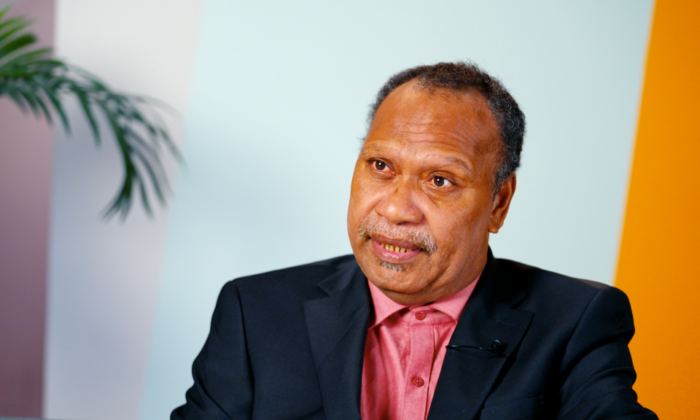‘We were trying to get an appointment but we haven’t got one,’ Daniel Suidani said.
When pro-Beijing candidate Jeremiah Manele won the contest to become the new prime minister of the Solomon Islands in May this year, observers predicted closer relations between the two—but few could have foreseen how far and how fast.
Within two months, Manele made his first official visit to Beijing, heralded by the Chinese Ambassador to the small Pacific nation, Cai Weiming, as a “model” of development.
The prime minister did not refute Cai characterising his country as “adhering to the one-China principle and firmly supporting China’s just stance on issues related to Xinjiang [the Uyghur Autonomous Region], Hong Kong, [Tibet], and human rights”—a ringing endorsement of some of the most controversial aspects of Bejing’s behaviour.
While most Solomon Islanders see the Chinese Communist Party’s (CCP) money flowing into the small country (whose GDP in 2023 was US$1.631 billion) as a positive, not everyone is happy.
Most of the opposition to the uncritical embrace of the CCP is centred on the largest of the more than 900 islands that make up the country, Malaita. There, surveyors have begun work on the first Chinese infrastructure project to be delivered under the agreement,
The nation’s capital, Honoria, has already seen the construction of national sports stadiums, dormitories for the Solomon Islands National University, The National Referral Hospital Comprehensive Medical Center, and the National Broadband Network.

Opposition, though, is small in number—so small that the think tank Foundation for Defense of Democracies (FDD) recently headlined a report: “Seventeen people in Malaita stand in way of China’s takeover of the Solomons.” But that was before an election that saw pro-CCP Prime Minister Manasseh Sogavare replaced by an even stronger supporter of Beijing in the form of Manele.
The Solomons had already switched its allegiance from Taiwan to China in 2019, and signed a security agreement that allows for the deployment of Chinese security forces (including the People’s Liberation Army) on the islands to protect Chinese citizens and business interests, as well as to put down civil unrest.
According to the FDD, Beijing made sure it got the result it wanted by buying itself more time to gain control, delaying elections by a year. A Chinese “slush fund” was used to pay 39 of the 50 Members of Parliament, most of whom then voted to postpone the elections that were scheduled for 2023.
But the Malaita Province Government (MPG), under the leadership of then Premier Daniel Suidani, had resisted CCP expansion after 2019.
It issued the Auki Communiqué, explaining it “acknowledges the freedom of religion as a fundamental right and … therefore rejects the Chinese Communist Party and its formal systems based on atheist ideology.”
Notably, the government also “specifically observed the need to be free from unwarranted interference of persons and therefore reject any notion of a police state.”
That couldn’t be allowed to stand by a Solomons government that wants to maintain Beijing’s favour, so the reaction was swift. It cancelled the Auki Communiqué and disqualified Suidani from his elected seat for not recognising the CCP’s One China Policy.
![Map of Australia's immediate neighbors in the western Pacific Ocean. (College of Asia and the Pacific/ANU/CartoGIS Services [CC BY-SA 4.0])](https://www.theepochtimes.com/_next/image?url=https%3A%2F%2Fimg.theepochtimes.com%2Fassets%2Fuploads%2F2022%2F04%2F10%2FSolomon-Islands-600x398.jpg&w=1200&q=75)
In an almost immediate symbol of the change, survey crews arrived in Malaita to commence the installation of Huawei cell towers that were going up elsewhere in Solomons but which had been blocked by Suidani.
He told the FDD that as as soon as he was ousted, the bribing began.
“Many of us have received phone calls … telling them if they join the [opposing] camp they will be given projects for their wards and also they will be receiving $300,000 [US$36,000] each. It’s getting to the next level,” he said.
That turned out to be his arrest, along with his advisor Celsus Talifilu, in early October. Both men were charged with organising unlawful assemblies and protests in Auki, the Malaita provincial capital, in 2021, and were released on bail.
“We must fight for this freedom, the democracy. We might change leaders but we want the system to remain that is what I always hold close to my heart so I will be still standing for the rights of my people,” he said just after being released.
Suidani said the people of Malaita weren’t happy but were unlikely to resort to violence due to the very heavy security presence. Australian and New Zealand Forces completed their last rotation in the Solomons (named Operation Lilia) in August this year.
He remains determined to resist the CCP’s encroachment, and has repeatedly sought a meeting with the Australian High Commissioner in Honaria.
“We were trying to get an appointment but we haven’t got one,” he said. “Maybe I’ll try again, but it’s very tough because they are always very busy.”

